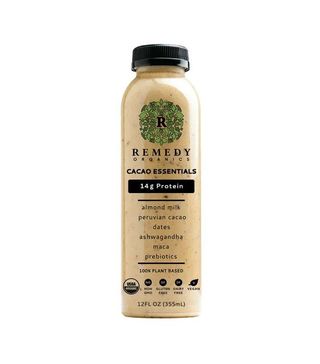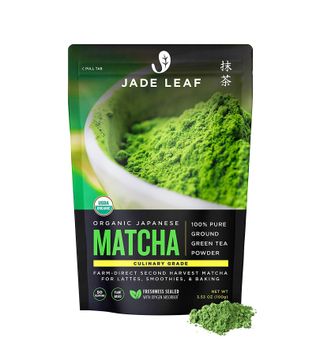This Fatigue-Fighting Solution Might Be Better Than a Cup of Coffee
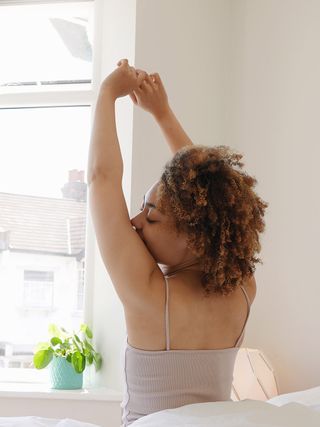
When your energy levels are zapped, it can be a big problem. You might feel sluggish and tired at work or school, and that could impact your performance. Fatigue can also affect your reflexes or critical-thinking abilities, which can mess with day-to-day tasks like driving. Not to mention being tired just doesn't feel good in general.
You can try a couple of things to fight that fatigue and boost your energy levels. Changing up your diet can help. "Any food that provides calories is going to give your body energy," says Jennifer Martin-Biggers, Ph.D., MS, RDN, VP of scientific affairs and education at Hum Nutrition. "We burn calories to fuel all of our body functions. Different nutrients and botanical ingredients have been studied to improve or increase feelings of energy." Getting back on a good sleep routine will do wonders for your tiredness, but it's easier said than done sometimes.
Of course, you can also just reach for caffeine for a quick pick-me-up. "For a quick improvement in energy feelings, caffeine is probably the most commonly used addition to our diets (think coffee, tea, energy drinks)," Martin-Biggers says. "Some people are quite sensitive to caffeine and may also feel a post-caffeine 'crash.' Sugar is similar—it will give you a quick boost in energy, as it increases glucose that is available for your body to convert to energy, but it can be followed by a crash and feelings of lethargy if you don't do something to burn off that energy and use up that glucose bump."
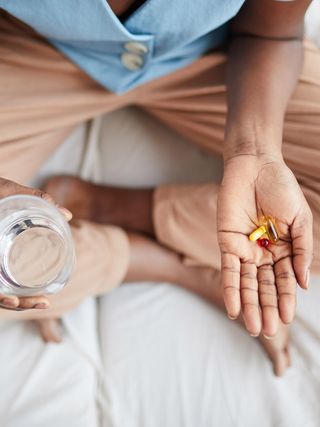
There are also some vitamins, minerals, and herbs that fight fatigue and might be worth trying if you don't want to rely on caffeine. Some vitamin deficiencies, such as with B vitamins and iron, can make you feel sluggish, so if you're not getting enough of those, you can try supplementation (preferably with the help of a healthcare professional). "B vitamins play key roles in energy production in the body, and vitamin B12 is particularly important to keep your nervous system and brain buzzing," Martin-Biggers says. "People who are deficient or have low levels of B12 can feel very sluggish and tired."
Martin-Biggers says there are certain groups of people who might benefit from supplementation for deficiencies and should consider their options with their doctor. "This includes people who follow a vegan diet and may need additional B12 or older people who may develop low B12 levels as our bodies are less efficient at absorbing B12 from foods due to decreases in stomach enzymes that naturally occur over time," she says. "Premenopausal women who may suffer from heavy menstruation also benefit from an iron supplement or a multivitamin that includes iron as blood loss can also reduce iron levels in the body."

There are some herbs and adaptogen supplements that can also help in the energy department, like ashwagandha, cacao, L-theanine, matcha, ginseng, and maca, according to certified holistic health counselor and founder of Remedy Organics Cindy Kasindorf, CHHC, AADP.
Here, she breaks down their benefits:
Ashwagandha: "[It] is an Ayurvedic herb and is often referred to as Indian ginseng," Kasindorf says. "If you are familiar with adaptogens, you may have come across ashwagandha, which has been used for centuries to help increase stamina as well as reduce stress."
Cacao: This is one Kasindorf's favorite natural stimulants since it is chocolate in its purest form. "This superfood contains theobromine, which increases blood flow both physically and mentally," she says. "It has been used for centuries in cacao ceremonies for its healing properties. Cacao is also rich in antioxidants and minerals."
L-theanine: "Naturally derived from tea leaves and combined with caffeine, this nootropic provides increased mental clarity and focus," she explains.
Matcha: Kasindorf says matcha is made from the highest-quality green tea leaves and is used to increase focus, energy, and endurance.
Ginseng: "[It] is a plant that has been around for centuries and has been shown to help fight fatigue and promote energy," she says.
Maca: This adaptogenic plant is a good source of vitamin C, iron, and copper, Kasindorf adds.
Kasindorf recommends taking these stimulating products in the earlier part of the day. "If supplements are taken later in the day, it may interfere with your sleep," she says. "Pay close attention to how these supplements make you feel throughout the day and adjust accordingly."
When shopping for a supplement, Martin-Biggers suggests doing your research and paying attention to the labels. Look for certifications that show that the supplements are of high quality and check the ingredient list for any fillers or other extras. "I always recommend looking for any information from a brand about a dose being the best for energy based on clinical research," she adds.
Take a look at some of the best supplements for energy to shop below.
1. Hum Nutrition Über Energy
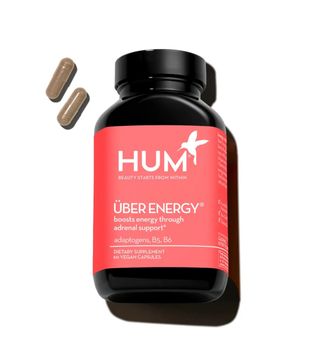
"I love and highly recommend Hum's Über Energy for an energy boost, especially when taken for several weeks, for an increase in overall feelings of energy. The active ingredients are standardized and at doses shown to be effective in clinical studies," Martin-Biggers says.
2. Remedy Organics Energize Me Shot
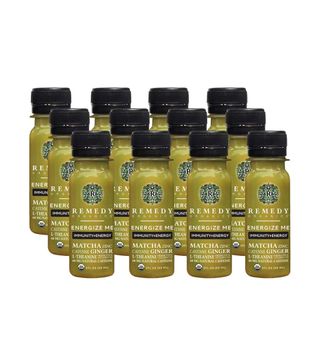
Kasindorf suggests trying out Remedy Organics' wellness shot for a quick burst of energy. It's a blend of Japanese matcha, ginger, and L-theanine.
3. Garden of Life Vitamin Code Raw B Complex
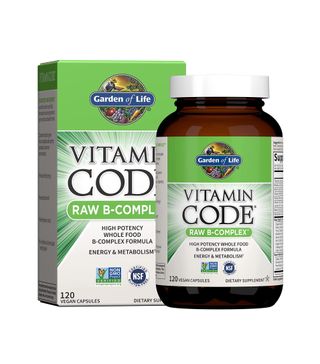
Garden of Life's B-complex is a blend of vitamins B1, B2, B3, B5, B6, B12, folate, and biotin, which keeps your energy levels up and also helps with stress.
4. Moon Juice Power Dusst
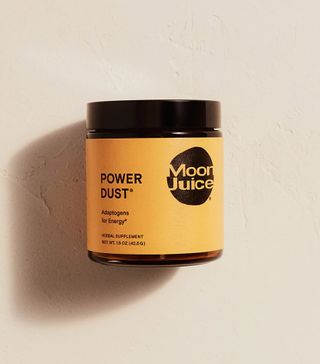
Add a teaspoon of this energy powder to tea, milk, coffee, citrus juice, or a smoothie. It contains organic ingredients: Cordyceps (supports healthy lung capacity), organic ginseng (for energy), eleuthero (for physical endurance), astragalus (supports a healthy immune response), ashwagandha (resists fatigue), rhodiola (to promote stamina and muscle recovery), and schisandra (for healthy cardiovascular function).
5. Hum Nutrition B12 Turbo
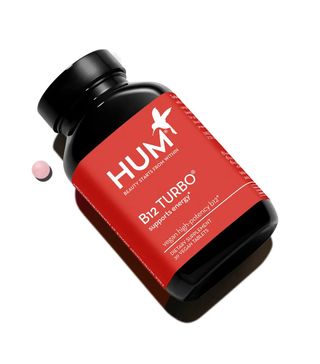
This vegan-friendly supplement contains vitamin B12 to support energy metabolism and brain and nervous system function, plus calcium for healthy bones.
6. Now Energy
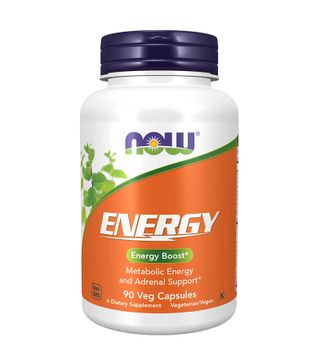
Now's Energy capsules are dairy-free, egg-free, kosher, gluten-free, non-GMO, nut-free, and vegan. Energy-boosting ingredients include B vitamins, green tea, Panax ginseng, and rhodiola.
7. Olly Daily Energy Gummy
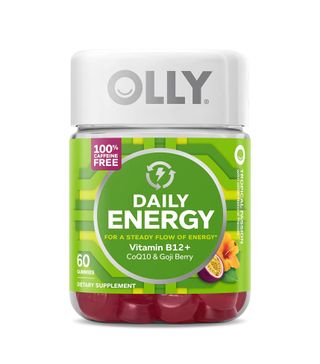
If you prefer a supplement in gummy form because it's easy to take, you'll like these tropical-flavored energy gummies. In addition to vitamin B12, there's CoQ10 and goji berry.
8. Nature Made Super B Energy Complex
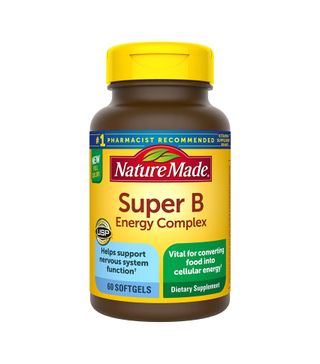
Super B Energy Complex supports energy metabolism and also a healthy brain and nervous system.
9. Sun Potion Organic Ashwagandha Ayurvedic Adaptogen Powder
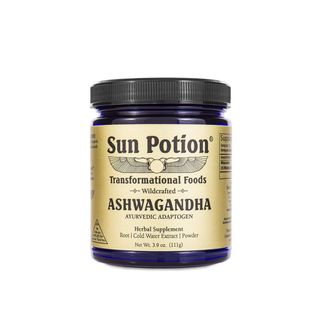
This ashwagandha is sourced from small organic farms in Northern India. Not only does the adaptogen boost energy, but it also promotes emotional and hormonal balance, brain function, and immune function.
10. Life Extension Ginseng Energy Boost
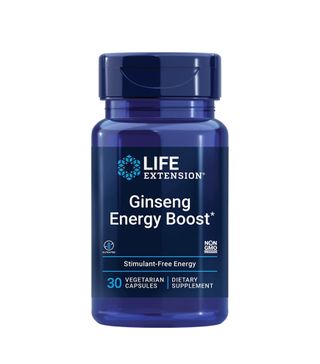
The key ingredient here is Panax ginseng, which Martin-Biggers says can play a role in energy levels. "Panax ginseng has excellent clinical research showing that it can help reduce feelings of fatigue and improve performance on mentally taxing tasks when used over time as well as having an immediate benefit," she says.
11. Viva Naturals Organic Maca Powder
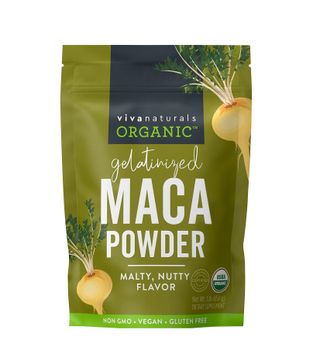
Like we learned above, maca has energy-boosting benefits, but did you know it also supports sexual health? This particular maca powder formula is gelatinized, which means it's easier to digest.
12. The Genius Brand Genius Mushrooms
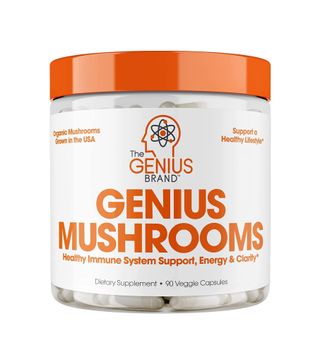
This is a blend of three amazing mushrooms—reishi, Cordyceps, and lion's mane, which all work together to improve your natural energy, enhance mental clarity, boost immune function, and detox the liver.
13. Garden of Life MyKind Organics Ashwagandha
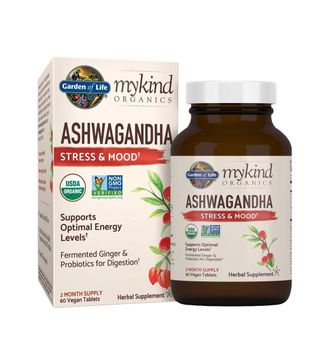
Need something that not only helps your energy but also relieves stress? This supplement does both. It's also formulated with fermented ginger and probiotics for better digestion.
14. Gaia Herbs Energy Vitality
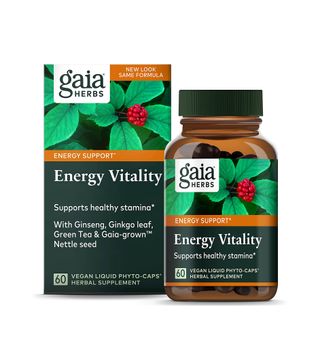
Ginseng, ginkgo leaf, green tea, and nettle seed work together in this supplement to promote energy and stamina. It also provides antioxidant protection and helps improve your stress response.
15. Moon Juice Cosmic Cocoa
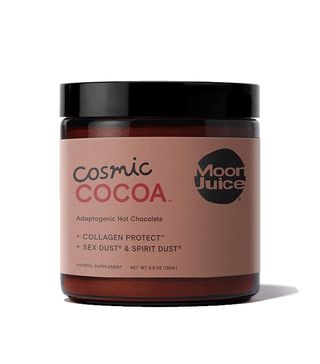
What if I told you hot chocolate could be a supplement, too? Well, with this one, it's a reality. Add this adaptogenic blend to hot water or warm milk. It contains organic cacao, ashwagandha, shatavari, and reishi.
16. Sports Research L-Theanine
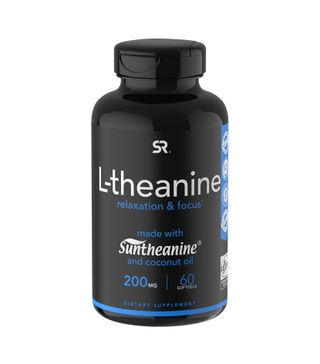
This L-theanine supplement promotes an "alert state of relaxation," so it's great for de-stressing, too.
Next, 7 Essential Oils for Energy and How to Use Them
Disclaimer
This article is provided for informational purposes only and is not intended to be used in the place of advice of your physician or other medical professionals. You should always consult with your doctor or healthcare provider first with any health-related questions.
Sarah is lifestyle writer and editor with over 10 years of experience covering health and wellness, interior design, food, beauty, and tech. Born and raised in Los Angeles, she attended New York University and lived in New York for 12 years before returning to L.A. in 2019.
In addition to her work on THE/THIRTY and Who What Wear, she held editor roles at Apartment Therapy, Real Simple, House Beautiful, Elle Decor, and The Bump (sister site of The Knot).
She has a passion for health and wellness, but she especially loves writing about mental health. Her self-care routine consists of five things: a good workout, “me” time on the regular, an intriguing book/podcast/playlist to unwind after a long day, naps, and decorating her home.
-
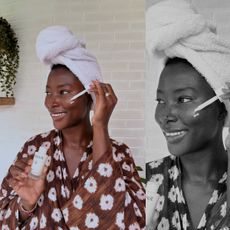 This Beauty Blogger's Wind-Down Routine Is Anything But a Snooze
This Beauty Blogger's Wind-Down Routine Is Anything But a SnoozeSee her go-to workout and her favorite vitamins.
By Virginia Yapp
-
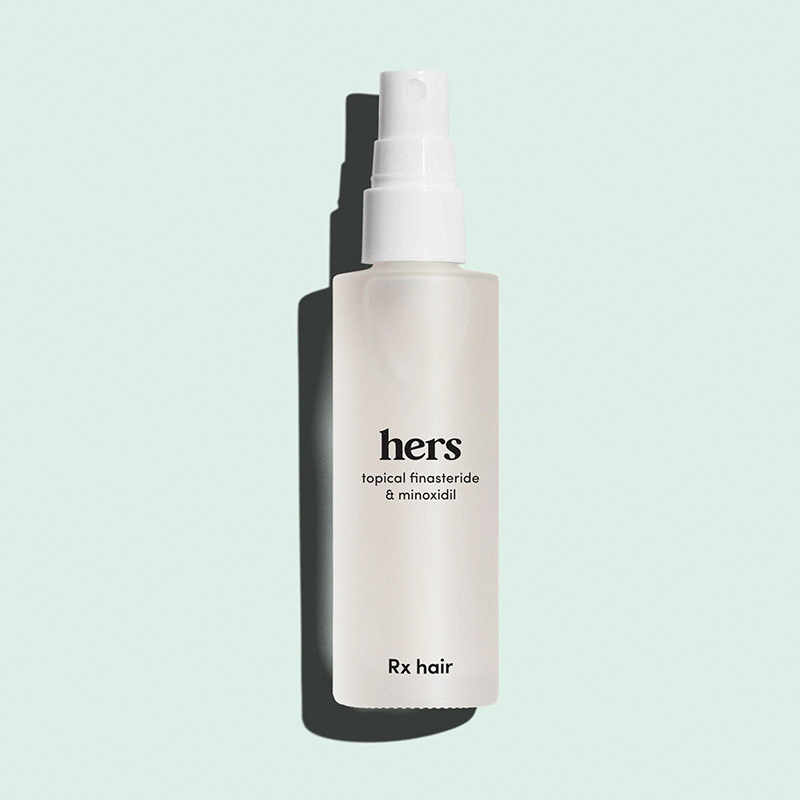 13 Products That Will Step Up Your Self-Care Game From Home
13 Products That Will Step Up Your Self-Care Game From HomeGet that glow from within.
By Natalie Gray Herder
-
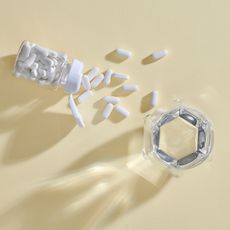 Don't Forget This Vital Ingredient When It Comes to Gut Health
Don't Forget This Vital Ingredient When It Comes to Gut HealthIt's crucial.
By Sarah Yang
-
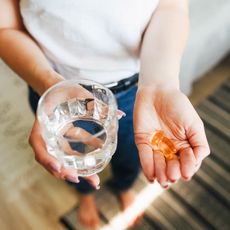 FYI: This Vitamin Affects Your Skin, Immune System, and Eye Health
FYI: This Vitamin Affects Your Skin, Immune System, and Eye HealthIt's a big deal.
By Sarah Yang
-
 Taking This Supplement Improves Sleep, Regulates Blood Pressure, and More
Taking This Supplement Improves Sleep, Regulates Blood Pressure, and MoreIt's an essential mineral.
By Sarah Yang
-
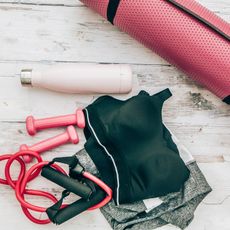 The Only Wellness Deals Worth Buying on Amazon Prime Day
The Only Wellness Deals Worth Buying on Amazon Prime DayTime to shop.
By Sarah Yang
-
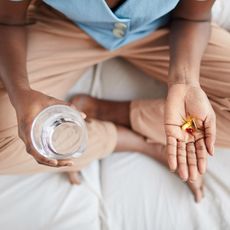 Taking This Daily Supplement Can Give You Whole-Body Protection
Taking This Daily Supplement Can Give You Whole-Body ProtectionAre you getting enough of it?
By Sarah Yang
-
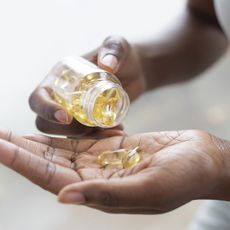 16 Essential Vitamins Every Woman Needs—and Might Not Be Getting Enough Of
16 Essential Vitamins Every Woman Needs—and Might Not Be Getting Enough OfTo help you feel good.
By Sarah Yang
